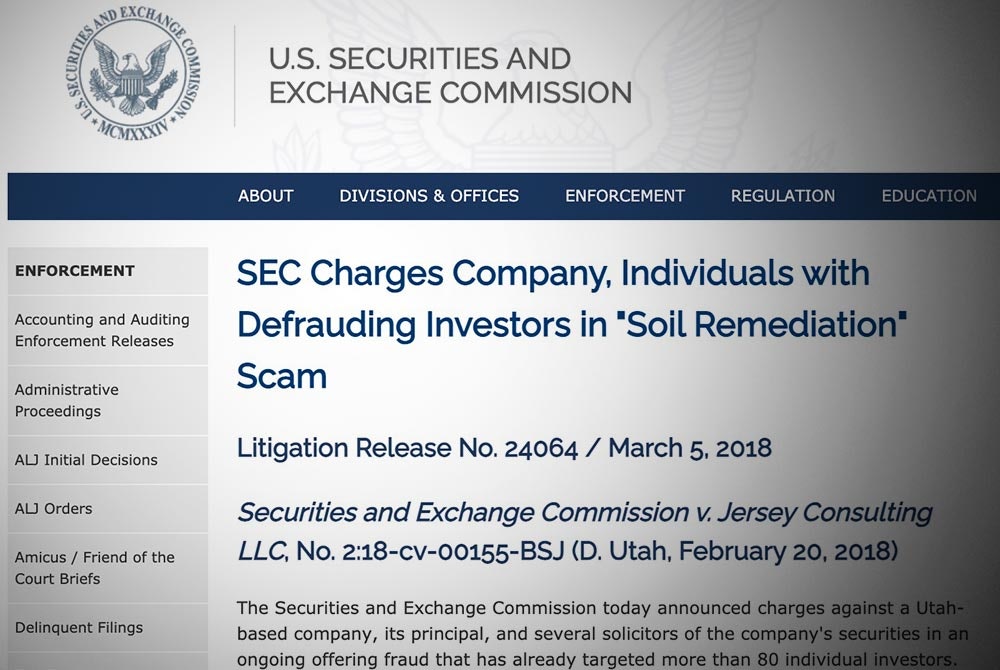Four men who pitched an alleged, groundbreaking “dirt into gold” mining technology are now in federal prison for laundering roughly $8 million purposely from older investors (most over 65 years of age).
Jonathon Edward Shoucair, Marc Andrew Tager, and Matthew Earl Mangum devised an elaborate telemarketing scheme to capitalize on older investors’ affinity for gold and the potential for more wealth. They told investors they could extract gold from dirt with their revolutionary mining nanotechnology developed by Mangum, a purported expert in metallurgy and precious metals refining.
In addition to hiding Shoucair and Tager’s criminal records of previous fraud convictions, the men went to extraordinary lengths to make the scam look and sound legit. According to a press release from the U.S. Department of Justice (DOJ), the men formed Jersey Consulting, LLC and created a website that claimed, “their revolutionary mining technology could achieve 20 times the yield of traditional mining at a fraction of the cost and that investors would achieve 100% percent returns on their money in 12 months.”
The scam also leveraged a fourth man, Kenneth Stephen Gross, responsible for cold-calling potential investors, to gauge interest and forward along to Shoucair and Tager.
Why Scammers Target Older Individuals
- They are usually more likely to be at home to answer phone calls
- They tend to be more trusting and willing to speak to unknown callers
- They tend to have more time on their hands
- They can be more vulnerable to investment returns due to fixed income
These men convinced 140 investors that their money would pay for space, equipment, materials, and labor to develop Mangum’s gold-extracting process into a large-scale, highly profitable business. However, victims of this elaborate telemarketing scheme provided nearly $8 million of funding that was only partially used to support the company, which was never profitable. One victim invested hundreds of thousands of dollars, believing the Jersey Consulting business was a legitimate and worthwhile business opportunity.
According to Brain Maxwell, a spokesman on behalf of the Utah Department of Commerce, the scam duo spent nearly $3 million of that $8 million, allegedly, on building the infrastructure around this business idea and paying for legitimate business expenses incurred by Jersey Consulting. Tager and Mangum reportedly claimed they extracted gold, but it was less than $30,000.
The U.S. Department of Justice noted another $3 million of the investor’s money went toward the personal benefit of Tager, Mangum, and Shoucair, with another $2 million of the funds paying the telemarketers of the scheme, including Gross.

All men have been sentenced to federal prison for their role in the “dirt into gold” scam.
- Gross received 24 months of probation for failing to disclose to federal authorities his knowledge of securities fraud.
- Mangum received 48 months in federal prison for conspiracy to commit wire fraud and money laundering.
- Shoucair received 72 months in federal prison for conspiracy to commit wire and mail fraud and money laundering.
- Tager received 43 months in federal prison for conspiracy to commit wire and mail fraud, money laundering, and possession of a firearm by a convicted felon.
Investigated by the Utah Department of Commerce Division of Securities and Special Agents from the Federal Bureau of Investigation and the Internal Revenue Service, this was not an easy fraud to uncover due to the sophistication and high level of deceit involved to pull it off.


Comments